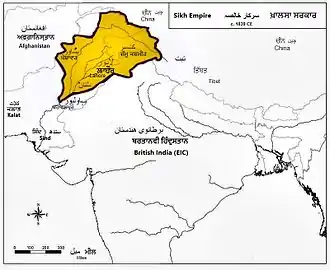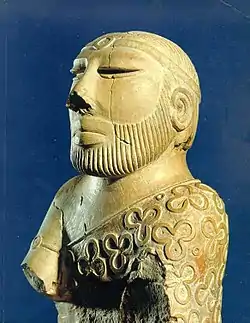Sikha Shahi
Sikha-Shahi is the term used to denote high handedness to Muslim elites[1] in Kashmir valley[2] and Punjab during Sikh Empire led by successors of Maharaja Ranjit Singh.[3][4] During Sikh period in Lahore, there is allegedly suppression in economic terms and in form of religious curbs on Muslims.[5] It is also used to refer to a Monarchy rule[6] or unfavorable court orders[7] in Pakistan especially Punjab province.[8][9] About 70 percent subjects were Muslim during Sikh rule ranging from Kashmir to Kabul.[10]

Maharaja Ranjit Singh's Sikh Empire at its peak in c. 1839
Part of a series on the |
|---|
| History of Pakistan |
 |
| Timeline |
|
See also
Notes
- Kamal, Ajmal (2015-01-11). "COLUMN:The uses of language snobbery:Urdu & the identity politics". DAWN.COM. Retrieved 2020-03-20.
- Lawrence, Sir Walter Roper (2005). The Valley of Kashmir. Asian Educational Services. ISBN 978-81-206-1630-1.
- Tandon, Prakash (1968). Punjabi Century, 1857-1947. University of California Press. p. 10. ISBN 978-0-520-01253-0.
- Nevile, Pran (2006-07-07). Lahore. Penguin Random House India Private Limited. ISBN 978-93-86651-91-4.
- "Back to Sikha Shahi rule?". Pakistan Today. Retrieved 2020-03-20.
- Shehzad, Rizwan (2018-03-06). "'Arbitrary rule': Sharif asks people to revolt against 'sikha shahi'". The Express Tribune. Retrieved 2020-03-20.
- "Court must act against Nawaz for 'Sikha Shahi' remark: Kaira". The Nation. 2017-12-21. Retrieved 2020-03-20.
- Allen, Charles (2012-06-21). Soldier Sahibs: The Men Who Made the North-West Frontier. John Murray Press. ISBN 978-1-84854-720-9.
- Reporter, The Newspaper's Staff (2018-03-06). "Ex-PM talks about power of vote again". DAWN.COM. Retrieved 2020-03-20.
- Hasan, Prof M. (2002). HISTORY OF ISLAM (2 Vols. Set). Adam Publishers & Distributors. ISBN 978-81-7435-019-0.
This article is issued from Wikipedia. The text is licensed under Creative Commons - Attribution - Sharealike. Additional terms may apply for the media files.